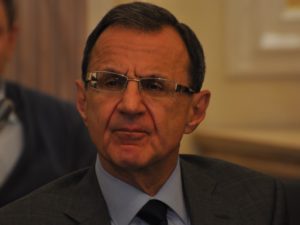[vc_row][vc_column][vc_empty_space][/vc_column][/vc_row][vc_row][vc_column][vc_column_text]

The methods and technologies of activities of Russian research centers, scientific institutions and universities that receive foreign funding were discussed on April 25, 2014 at the meeting of the Russian Public Council for International Cooperation and Public Diplomacy with representatives of federal authorities, specialized agencies, research institutes and universities.
“Everyone is well aware that a number of individual research centers, scientific institutions and universities receive foreign funding and engage in political activities, influencing the formation of politics and public opinion in Russia, just as nonprofit organizations do,” said Council Chairman Sergei Ordzhonikidze.
“Obviously, every country has its own interests with regard to Russia, very often they do not coincide with the national state interests of our country. We would like to know what the nature of these activities are, what are the topics, who finances them,” he stressed.
In the United States, he said, nonprofit organizations, research and teaching centers work together with the government. “I have never seen a more or less serious institution that works against its government in the United States. There are some harsh measures taken against such. We have a different attitude: a notification procedure, India has a permissive one,” Ordzhonikidze noted.
“We need to know what these organizations do. What institutions, in the interests of what countries operate on the territory of Russia. The structures referred to in the report are funded by all known Carnegie Center, MacArthur Foundation, Ford Foundation and others, the main capital of which is formed by the United States and the State Department in particular. NATO also participates in funding. The issue we are raising is extremely important for non-interference into the domestic politics of the forces which are interested in weakening the country,” stressed Ordzhonikidze. Such organizations, he said, worked in Ukraine.
“On March 6, a report prepared by the Russian Institute for Strategic Studies together with the Center for Current Politics, “Methods and technologies of activities of Russian research institutes that receive foreign funding,” the chairman of the Council for International Cooperation noted.
The authors of the report drew attention to the activities of the Russian Association of Political Science, the Center for Political Research of Russia (PIR Center), the ANO Levada Center and others. “For example, on the eve of the 2012 elections, according to its surveys, the Levada Center noted that Vladimir Putin enjoys the support of only 30% of the population,” stressed the chairman of the Council.
“And how should the interaction between NGOs and the state be structured under the new conditions? We must work toward replacing foreign funding with Russian,” many participants noted.
Many agreed that there shouldn’t be projects with 100 percent foreign funding, but if Russian funding is fifty percent, then we can let others think about it.
He suggested creating a fund that would fund research for foreign policy organizations.
“We are a major power, we should not be on someone else’s payroll,” confirmed Veronika Krasheninnikova, OP member and director general of the Institute for Foreign Policy Studies and Initiatives.
Oksana Gaman-Golutvina, president of the Russian Association of Political Science, expressed confidence in the necessity to promote Russian interests through non-governmental organizations operating in the post-Soviet territory.
She regretted that, due to the lack of Russian funding, universities and research organizations are forced to turn to foreign funding. MGIMO, for instance, is only 30 percent funded.
Veronika Krasheninnikova pointed out that Russia provides presidential grants. She particularly emphasized that those who complain about the lack of money somehow do not want to ask their state for it.
Oksana Gaman-Golutvina and Svetlana Ayvazova, a member of the Presidential Council for Civil Society and Human Rights, argued that the report contains inaccuracies and mistakes.
In their view, the use of the term “foreign agent” undermines the credibility of NGOs.
“It is a shame to be considered a foreign agent,” said Ambassador Extraordinary and Plenipotentiary Vladimir Kotlyar, member of the International Legal Council under the Russian Ministry of Foreign Affairs. But the meaning of the words “foreign agent” has a different meaning, “it is not at all an accusation of espionage,” he stressed.
“We have to admit that there is a practice of influencing through NPOs in the interests of certain services. The non-profit sector was a catalyst for destabilization in Ukraine,” a member of the Public Chamber Georgy Fedorov reminded the audience.
Sergey Markov, head of the OP’s Inter-Commission Working Group on International Cooperation and Public Diplomacy, agreed with the author of the report that a system of foreign influence on Russian society is being created: “I believe that both the law “On NCOs” and this report are a reaction to increasing external pressure.
In his opinion, Russian financing funds must be created. A system of Russian participation in foreign projects must be created. Legislation should clearly spell out what constitutes political activity in the interests of a foreign state.
Mikhail Smolin, deputy director of the Russian Institute for Strategic Studies, where the report was prepared, said: “We are closely watching the reaction to the Report. To a certain extent it is nervous, which is perfectly natural. But we have not published all the information, since we know considerably more.”
In his opinion, the greatest danger for Russia is the fact that the grantees “research not for themselves, but to pass on to their customers, who show their unfriendly attitude toward Russia.
The meeting of the Russian Public Council resulted in a statement.
Press Service of the Russian Public Chamber
[/vc_column_text][/vc_column][/vc_row]